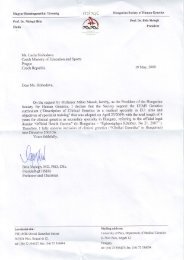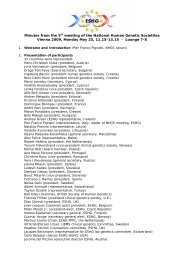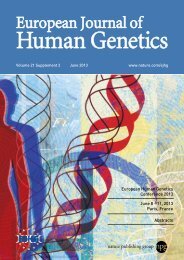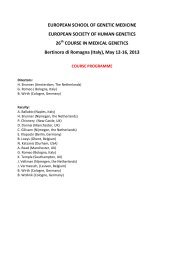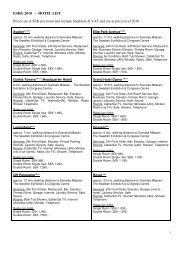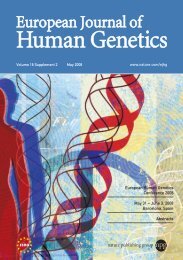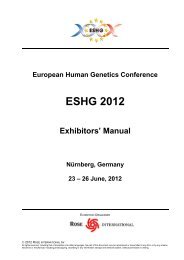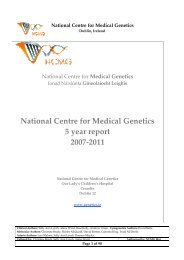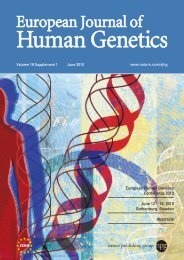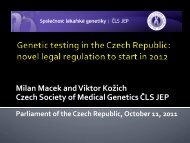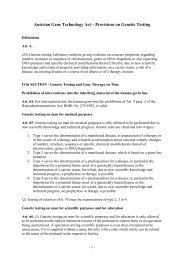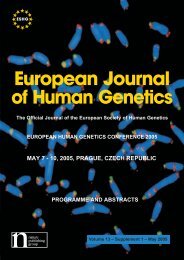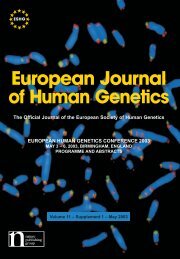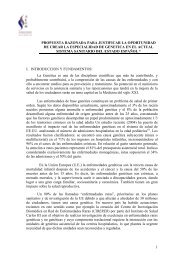2002 Strasbourg - European Society of Human Genetics
2002 Strasbourg - European Society of Human Genetics
2002 Strasbourg - European Society of Human Genetics
Create successful ePaper yourself
Turn your PDF publications into a flip-book with our unique Google optimized e-Paper software.
Welcoming Addresses<br />
Dear Colleagues,<br />
It is particularly fit to have the ESHG/EMPAG meeting in <strong>Strasbourg</strong>, as this city houses the <strong>European</strong> Parliament and many other<br />
<strong>European</strong> institutions, such as the Council <strong>of</strong> Europe, the <strong>European</strong> Court <strong>of</strong> <strong>Human</strong> Rights, and the <strong>European</strong> cultural TV channel<br />
Arte. It is also host for the headquarters <strong>of</strong> the <strong>Human</strong> Frontier Science Program Organisation and <strong>of</strong> the <strong>European</strong> Science<br />
Foundation, organisations that foster international scientific cooperation.<br />
<strong>Strasbourg</strong> has a rich history in medicine and in genetics. Medical teaching was established in 1540, and a first chair in medicine<br />
created in 1585. The university hospital has important architectural remains <strong>of</strong> this period (the old pharmacy and the wine cellar, both<br />
still active). Neur<strong>of</strong>ibromatosis was first described there in 1882, by Friedrich von Recklinghausen, the pr<strong>of</strong>essor <strong>of</strong> pathology, who<br />
also introduced the name haemochromatosis in 1889. DNA, discovered in the nearby city <strong>of</strong> Basel, by Friedrich Miescher, was soon<br />
studied in <strong>Strasbourg</strong> by the young Albrecht Kossel, later a Nobel Laureate for his work on the chemical constitution <strong>of</strong> proteins<br />
and nucleic acids (and appropriately, our daily newspaper is called DNA!). The city hosts several major public research centres in<br />
molecular and cellular biology and genetics, and biotech companies. Basel, Freiburg, and Heidelberg, three other major centres <strong>of</strong><br />
research in biology and medicine are located within 150 km from <strong>Strasbourg</strong>, leading to trinational co-operation for development and<br />
teaching <strong>of</strong> biotechnology.<br />
<strong>Strasbourg</strong> is one <strong>of</strong> the most beautiful <strong>European</strong> cities, rich in architectural treasures (including its magnificent cathedral in pink<br />
sandstone), in picturesque sites with rivers and canals bordered by half-timbered houses or stone palaces, and in art museums. Our<br />
city has a very active cultural life. The social programme will allow you to see the brand new Museum <strong>of</strong> Modern Art , sample local<br />
gastronomic delights in the beautiful Neo-Renaissance Aula <strong>of</strong> the Palais Universitaire, and listen to excellent music, from Bach organ<br />
works played on an epoch instrument to lively Gipsy Jazz (two specificities <strong>of</strong> Alsace musical life). The gourmet will find an extensive<br />
choice <strong>of</strong> restaurants, from the most sophisticated 3-star Michelin cuisine to the busy and picturesque “wynstubs” around the<br />
cathedral, or to a score <strong>of</strong> tantalising pastry shops. All these attractions are within 10 minutes reach <strong>of</strong> the Congress Centre, using the<br />
fast high-tech tram system. For pre or post congress leisure, one can enjoy the beautiful villages lining the Route du Vin (Wine Road),<br />
overlooked by romantic medieval castles, and the picturesque town <strong>of</strong> Colmar (hosting the famous Issenheimer altar by Grunewald).<br />
The scientific programme <strong>of</strong>fers excellence for all pr<strong>of</strong>essionals interested in human and medical genetics, and pr<strong>of</strong>itable encounters<br />
with colleagues, in an enjoyable environment. We are particularly pleased that the meeting is a joint one with the <strong>European</strong> Meeting<br />
on Psychosocial Aspects <strong>of</strong> <strong>Genetics</strong>. The number <strong>of</strong> registered participants and exhibitors, the largest ever at an ESHG conference,<br />
is a testimony <strong>of</strong> the attractiveness <strong>of</strong> our meetings and <strong>of</strong> the growing importance <strong>of</strong> ESHG.<br />
I cordially welcome you and wish you a fruitful and exciting conference from the scientific as well as from the social point <strong>of</strong> view.<br />
Dear Colleagues,<br />
Bienvenue à <strong>Strasbourg</strong>,<br />
Jean-Louis Mandel<br />
Local Host ESHG <strong>2002</strong><br />
On behalf <strong>of</strong> all the members <strong>of</strong> the EMPAG-<strong>2002</strong> programme committee, we welcome participants to our meeting which<br />
focuses on the psychological and social aspects <strong>of</strong> genetic disease, genetic risk and genetic testing. While the EMPAG<br />
meetings started more than 10 years ago, this is the first to be held in conjunction with the <strong>European</strong> <strong>Human</strong> <strong>Genetics</strong><br />
Conference organised by the ESHG. We consider this an important occasion, reflecting the enhanced awareness <strong>of</strong><br />
psychosocial issues amongst colleagues from all disciplines working in human genetics and stimulating a multidisciplinary<br />
approach in genetic clinics in a growing number <strong>of</strong> countries.<br />
The scientific programme committees <strong>of</strong> both conferences have worked together in a very positive way to provide a programme<br />
with jointly organised as well as independently organised sessions which are also accessible to the participants <strong>of</strong> both meetings.<br />
Hereby it was a prerequisite to enable the EMPAG meeting to retain its own identity including opportunities for participants to<br />
meet informally with colleagues with similar interests, but also to attend sessions together with colleagues attending the ESHG<br />
conference. In addition, ESHG participants are welcome in all EMPAG sessions.<br />
We believe that the EMPAG programme <strong>of</strong> invited presentations (in sessions planned together with the ESHG), oral<br />
presentations based on submitted abstracts, poster presentations and a workshop, reflects the “psychosocial contribution” being<br />
made by researchers and genetic counselling practitioners in the field <strong>of</strong> human genetics in Europe and beyond. We look<br />
forward to the lively and thoughtful discussion which we have come to associate with EMPAG meetings. We also hope that the<br />
anticipated success <strong>of</strong> this first opportunity to hold our meeting in conjunction with ESHG will be an important step resulting in<br />
more collaboration to the benefit <strong>of</strong> individuals and families confronted with genetic disease. We wish all EMPAG participants a<br />
worthwhile, stimulating, and <strong>of</strong> course enjoyable, few days in <strong>Strasbourg</strong>.<br />
Gerry Evers-Kiebooms Lauren Kerzin-Storrar<br />
Co-chairs EMPAG <strong>2002</strong><br />
5



